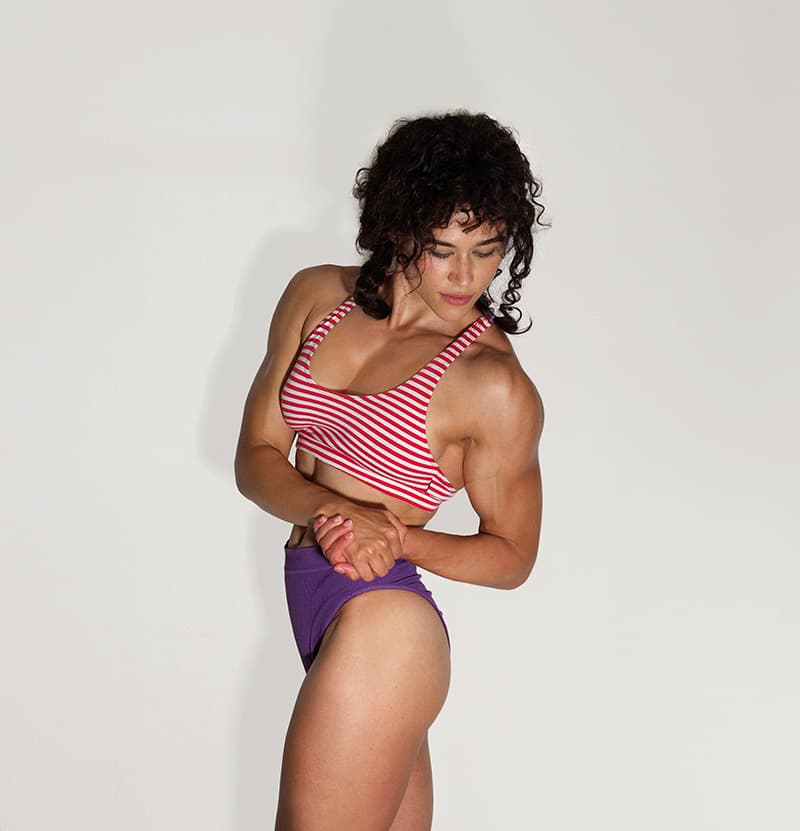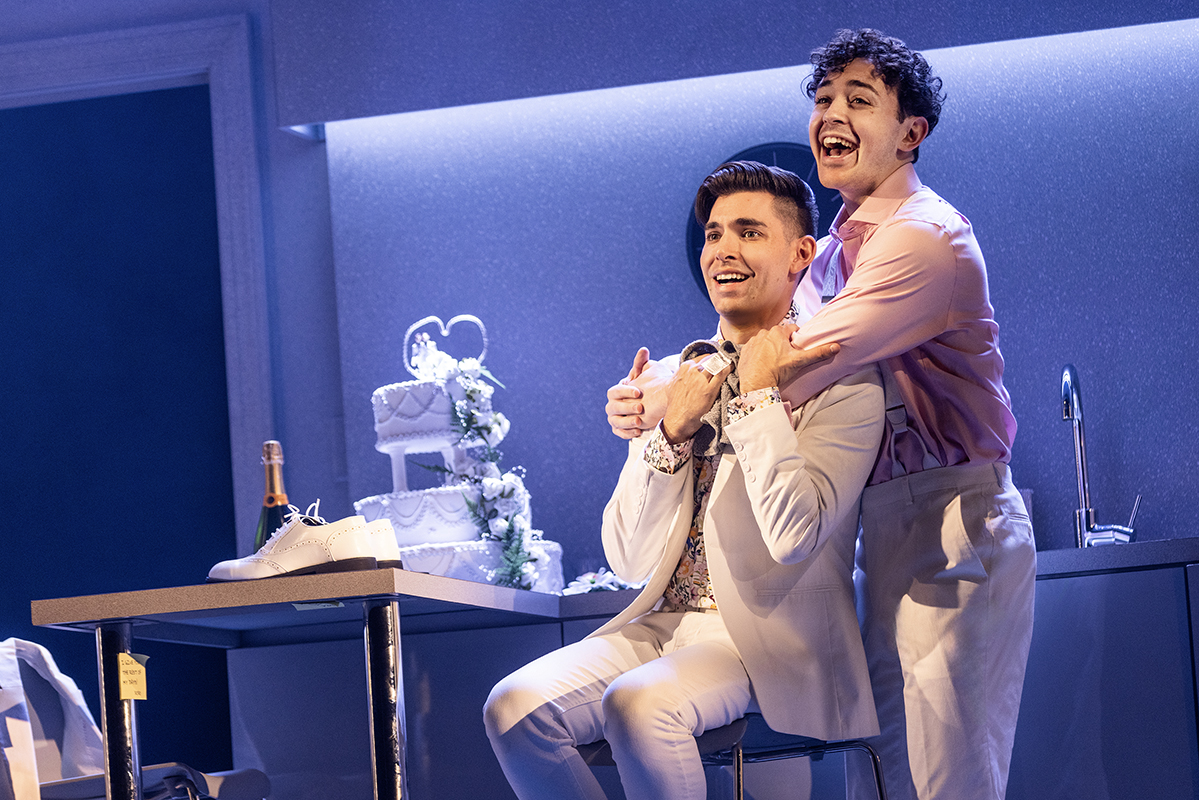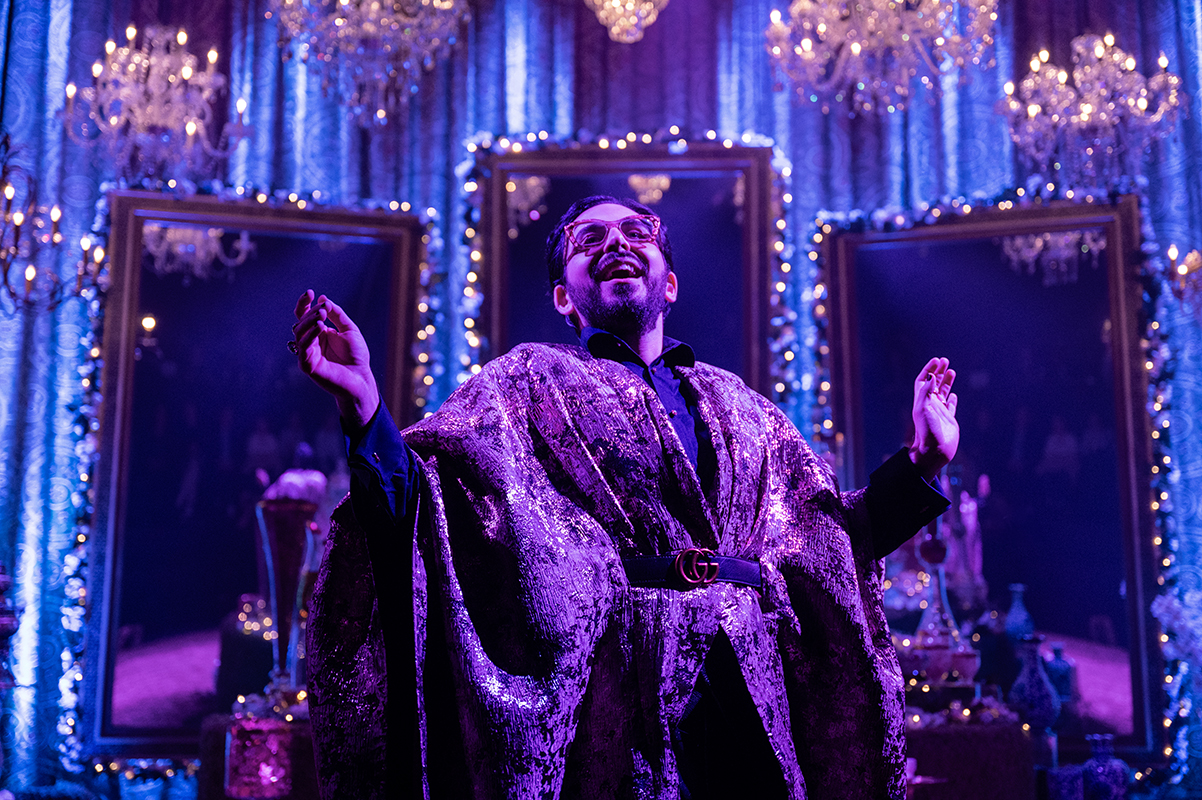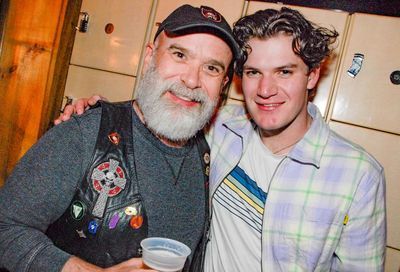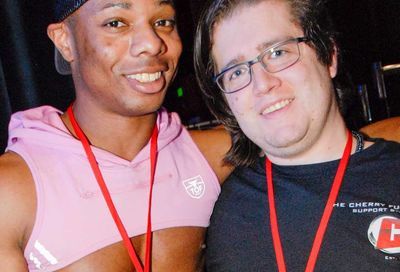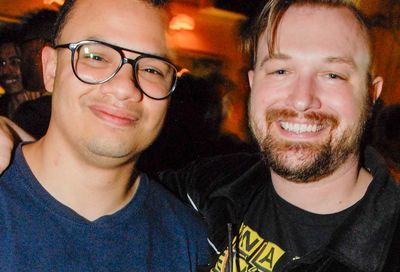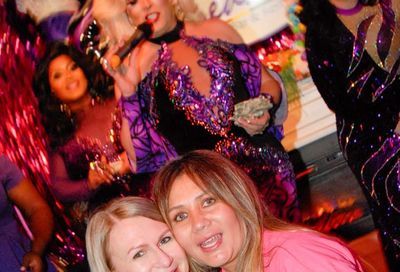Lily Tomlin on Grace and Frankie, the current state of society, and the two most important Janes in her life
The Award-winning actress and LGBTQ icon spoke to Metro Weekly ahead of her Kennedy Center show

“My god, we’ve been talking for a long time!”
Indeed, a scheduled 30-minute interview with Lily Tomlin has somehow reached the 100-minute mark — a rarity with almost any celebrity. Despite her pronouncement, on this particular Monday afternoon, the award-winning actress and comedian seems happy to remain on the phone, at times even breaking into her famous characters to punctuate a point. The only thing preventing our call from overtaking the entire afternoon is that Tomlin and her wife, Jane Wagner, are expecting guests.
Tomlin is exactly as you’d expect her to be — warm, wise, welcoming. When the conversation takes a turn toward discussing our mothers — hers is deceased, and mine is laid up with a hip injury — she shows deep and genuine concern, offering homespun advice on mobility solutions.
It’s not at all surprising, really, considering that the overarching topic of her current hit comedy, Grace and Frankie, is how society copes with aging. Tomlin stars as the free-spirited half of two women whose husbands left them — for each other — and who come to depend on one another for companionship. Out of an initially testy relationship gently flowers a deep, abiding, loving friendship between the pair. With the glut of content on Netflix these days, Grace and Frankie stands out as a miraculous oasis of both originality and familiarity. In the old days, they would call it “Must-See TV.”
The show, entering its fifth season on Netflix in 2019, is not only a terrific showcase for Tomlin and costar Jane Fonda, but deals with authentic issues that confront the elderly, including the ennui of retirement, the need to feel like one is still a viable member of society, late-in-life romance, and even how arthritis impacts the ability to masturbate.
To call Grace and Frankie a sitcom would be to diminish the depth of its purpose. Yes, it’s extremely funny, and is superbly acted by its two leads to the point where you’d think you were watching an ongoing master class, but the program swells with honest heart and, thanks to Tomlin, delightful, offbeat quirks. It has something for everyone, not least the LGBTQ community in the way it expresses its main gay relationship between two men well into their seventies. It doesn’t hurt matters that both Marin Sheen and Sam Waterston give themselves over fully to their characterizations, with the latter breaking free of his years as a stern, hard-nosed DA on Law & Order, and offering up a performance overflowing with whimsy and wonder.
“I had never worked with Sam before,” recalls Tomlin. “He came in on the first day of shooting, and was just like a big puppy dog. You can absolutely believe he could have been Frankie’s husband for 40 years, and they’re best friends, and Frankie was in love with him, and really valued her relationship with him. But she wants him to be happy.”
Fonda, of course, is a longtime friend of Tomlin’s, and the pair had worked together before, most notably in Nine to Five, the 1980 comedy that also starred Dolly Parton, Dabney Coleman, and the great British veteran Jean Marsh. In it, three put-upon office workers teach their abusive, harassing, sexist boss a lesson he’ll never forget. Tomlin is optimistic that a sequel, featuring the original cast, is imminent.
Tomlin, who will appear next Wednesday, Oct. 17, at the Kennedy Center Concert Hall for an evening celebrating some of her most treasured characterizations, from Ernestine to Edith Ann to Mrs. Beasley to Tommy Velour, is just happy to be working.
“I don’t feel like I’m working hard,” says the 79-year-old. “If you have the energy, you want to work.” Still, she admits she’s happiest when collaborating with Wagner, the brilliant writer who has been a guiding force behind some of Tomlin’s most memorable achievements, including the Tony-winning Search for Signs of Intelligent Life in the Universe. “If Jane is going to work on it, it’s going to be something revolutionary,” she glows of the woman she married in 2013 after 42 years together.
Even though she officially came out late in life, Tomlin’s sentiments toward her LGBTQ community are filled with the kind of sincerity that emanates from her naturally.
“I’m so proud of this community, and what it’s accomplished in such a short time,” she says. “I never dreamed in the ’60s and ’70s that all this would ever happen so quickly. The community has just always been there for each other. I just love it.”

METRO WEEKLY: Let’s start with Grace and Frankie. We’ll be seeing the fifth season soon.
LILY TOMLIN: Yes, we’re going to start shooting the sixth season in January.
MW: Did you expect it to take off like it has?
TOMLIN: No, god, no. We didn’t know what to expect. We were lucky, Jane and I. Marta Kauffman called both of us and said she had an idea for a show for us. Netflix was just starting to crest in terms of its popularity. We got in right after House of Cards. So we were just kind of excited to do it, to be in that new venue. And it turned out so well, and we’ve had so much fun doing it. And we got such great people. Martin and Sam were so adorable. And [the actors playing] our kids are so good, each one is so different.
MW: Has it been challenging, going from year to year, to come up with narrative arcs, to make it feel as natural as it does?
TOMLIN: No, it hasn’t been terribly difficult. Jane and I were very excited to be able to do two women of our age. And, it was Marta’s intention to show what they’re up against in terms of society, marginalization, and discounting. It was great to have the husbands leave them for each other, so we have that whole gay issue.
But, of course, no one knew how we were going to do it. I’m thinking maybe Marta knew — I hope she knew. And how she’s able to stay ahead of each year, I don’t know. Very often we have input to certain things about our characters. We say when we’re uncomfortable with something that the character’s asked to do, or if we think it betrays the character, but that doesn’t happen very often. We have a great set of writers. It’s just sort of blessed.
MW: The show deals with sex and the older set so forthrightly. The whole creation of the vibrator business was hilarious, but at the same time really dealt with sexual issues in a way that younger people don’t think about. It’s groundbreaking in that regard.
TOMLIN: Yeah. I could’ve become the vibrator maven if those were operable. People would write us, “Can you get me a couple of those vibrators?” I’d just say, “There’s plenty on the market, you could probably buy one easily, but these don’t work. They’re props.” God help us, though, they’re huge.
MW: Frankie seems very suited to you in terms of our general perception of who Lily Tomlin is as a known celebrity. How much do you share in common with her as a character?
TOMLIN: As the years have gone on, I don’t try to create a character as much as I kind of live it. I find more and more characters that I attempt are closer to me — or maybe it takes less to convey a character. I feel very close to Frankie. I do what comes naturally to me in the role. Of course, you bring your experience as an actor to the part and you fill out certain moments.

MW: Your rapport with Jane Fonda is incredible.
TOMLIN: Well, I just believe she is Grace, and I guess she believes I’m Frankie. We get a lot of pleasure out of it. Sometimes we get to laughing so much, we keep the crew until two in the morning. That doesn’t go over great. [Laughs.]
I truly love Jane. Jane’s a great friend, and has been for years. When our characters have a fight, we both get affected by it — we get sad that we’re having a fight. I know audiences like our friendship immensely. Netflix has let us know that. They don’t let us know much else, but they let us know that.
MW: They don’t give you feedback?
TOMLIN: They don’t. That’s how they operate. They don’t want you to know just how popular the show is. But they keep renewing it, so as long as that happens, I guess we should probably enjoy the fruits.
MW: How much further do you think the show can go? Is there a point where you’d say, “Okay, we’ve told all the story that we need to tell.”
TOMLIN: No. I think Jane and I want to completely age for the audience. But we’re youthful — we don’t age too well. Well, we don’t age too rapidly. And we have a great cinematographer, I must say. I guess he could lay down on the job and we’d age faster. But Jane is always saying, “I want to go until we really can’t walk.” I think, “Well, okay, I’ll hang in there with you.”
MW: The show has been especially good at conveying the relationship between Martin and Sam’s characters. While it’s hard to condone what they did to their wives, their relationship is sweetly portrayed, and allows the show to have a unique LGBTQ angle. How important was it to you, as a member of the LGBTQ community, that a gay relationship be part of the equation.
TOMLIN: Very important, very important. There’s only been one time that I called about a scene on the show. It was during one of the protests, and Martin and Sam have a bunch of gay friends around. I thought the director had just let them go too far. Not Sam and Martin so much, but the other guys. They just kind of overdid it. I called and asked if they couldn’t look for another cut in this one scene. I think all that stuff can be cumulative and color the audience’s reaction.
MW: Occasionally, I’ll come across sitcoms from the ’70s on cable — All in the Family, for instance — and am genuinely shocked about what they got away with. Obviously, these were shows designed to provoke and make you consider society’s mores through the laughs. All in the Family, in particular, held a huge mirror up to society. I wonder what would happen if we had an Archie Bunker archetype on network TV now.
LILY: [Conservative audiences] would just see that character as a validation of their own feelings. It’s more dangerous, unless the writer is able to infuse the project with a morality that somebody would produce, and distribute. There’s not too much morality anymore either, in terms of writers. I mean, that was the writer’s duty at one point — to create a more progressive tolerance in society. I don’t know if that’s always true anymore.

MW: Speaking of society today, what are your thoughts on how it’s shifted in the past several years?
TOMLIN: It bothers me terribly. I keep thinking, “Well god, how much longer do I have? What is the world going to be like before I exit the planet?” It’s gotten like it’s just a battle — who can dominate? Can a more progressive agenda in this country take over from this terribly restrictive, old-fashioned, really misogynistic, racist kind of ethic that everybody’s living by on the other side? They seem rabid in their beliefs.
It’s just all mixed up, because of people’s limited beliefs. I’m terribly frightened — if they are able to continue and dominate — of what might come of being a gay person in this culture. You think nothing can happen, but you have to vigilant. You just don’t know.
MW: Do you worry that with Kavanaugh on the Supreme Court, things will end up badly for society?
TOMLIN: I’m way worried. He should’ve withdrawn a long time ago. And a normal president would’ve withdrawn his name. It’s the first sign of real trouble. You feel Trump wanted him desperately so that if he does get into trouble with [special counsel Robert] Mueller that this justice will fight for him to be exonerated, to not be indicted at all, to not have anything brought against him, that he’s above the law. Kavanaugh will endorse that. He said it in his writings, he said it in his speaking. And, of course, I worry about Roe v. Wade, and anything else that this guy can [help] overturn.
MW: We’ve had a lot of discussions in our staff meetings about whether or not gay marriage would be overturned. I think what they’ll do is bolster religious freedoms to the point where they make things as difficult as possible for us.
TOMLIN: Did you ever see that film — an anti-Nazi movie, I can’t think of the name — that all they did was change the law incrementally? They just carefully kept changing the law, changing the law, until finally it was a world that the Germans wouldn’t even recognize, allowing the absolute siege of the Jews and anyone else they didn’t like — gays — in the country. In the Holocaust museum in Berlin, they have notebooks filled with the directions — the Nazi directions — for how to vanquish the Jews. And gay people. It’s just horrifying.
You have to think in the worst possible scenario when people have a racist, misogynistic, anti-gay everything mindset. You just want to stop them now. There just comes a time when the human’s mindset has to change, it has to grow and change and do better for other people.
MW: The president’s son, Donald Jr., said he’s more worried about his sons being accused of sexual assault than his daughters being assaulted. It’s disturbing these people don’t truly understand what any of this #MeToo movement is about.
TOMLIN: It’s a power thing. They have never cared. Even if they have daughters, they haven’t really been aware of, or even sensitive to, generally speaking, what their daughters are up against. Edith Ann says it best, she says, “Kids learn how to act in the world by seeing how grown-ups act in the world.” I do not think the world will ever get better unless this changes.
MW: We’re told that one of the things that will come out of all this furor over Kavanaugh is that even more women will seek office. Elizabeth Warren, apparently, is seriously considering a run for president, for instance.
TOMLIN: If women really take power, or even if they make the power equal, there will be a backlash against them. The current order will really try desperately to discount them.

MW: It occurs to me that Nine to Five should be considered a harbinger of the #MeToo movement. The women take charge and deal aggressively with a sexist boss. The movie was an initial call to arms, even in 1980.
TOMLIN: I’ll take that!
MW: There have been rumors that there’s going to be a sequel.
TOMLIN: Yeah, they’re working on it. It’s being written right now. I’m pretty sure Jane [Fonda] will be an executive producer on it. We’ve had input on the script a little bit. We hope it comes to fruition. I think it will, because everybody’s so excited about it. Jane, Dolly [Parton], and I are already on board. I’m sure there’ll be another generation, but we’ll be very significant to the plot.
MW: What can we expect from your upcoming performance at the Kennedy Center?
TOMLIN: I use video in the show to sort of ridicule myself, and have perspective on that, to maybe reflect on a character’s history. But it’s totally entertaining, totally funny. I talk to the audience about the world, and segue into different monologues, and do about ten characters.
MW: You have quite a canon of characters. Is there one you love doing the most?
TOMLIN: [Laughs.] That’s like asking Mrs. Duggar which of those 19 kids she really has a soft spot for. I don’t really — they’re like people to me. I like to have them in my life.
I opened my first Broadway show in 1977. And Mrs. Beasley — she’s a Red Cross volunteer, and she had like a Florence Nightingale with the big hat piece, with the silk hanging down, and the cape — handed out coffee and donuts and Kleenex to the kids in line. Because, in those days, my fans were sleeping in sleeping bags to get good seats on the first day the box offices were open. So she was out there walking the streets for hours with the kids, and giving them Kleenex to blow their noses. All day I was out there. Well, Mrs. Beasley was.
MW: That’s amazing. How did they react to that?
TOMLIN: They kind of expected it, I think. Or I’d conditioned them to expect it. I don’t do that so much anymore, because by and large my fans are older. They certainly don’t sleep in sleeping bags, for the most part. In those days, though, the fans that were really fans, they were just adorable. They knew everything about the characters, and they’d ask you everything. They’d validate you on every point.
MW: What year did you come out?
TOMLIN: I don’t remember. I think it was like 2000.
MW: Is it true that in the ’70s Time magazine promised you a cover, but only if you’d come out?
TOMLIN: Yes. I was kind of insulted. It wasn’t like Time was saying, “We want to put you on the cover for your work,” but “We want to put you on the cover for you being gay.”

MW: Why didn’t you do it?
TOMLIN: It would be very early for me, and it would’ve been really tough. My mother is from Kentucky — she’s dead now, but she was from Kentucky, and she was fairly Fundamentalist. All her family, her sisters, and her mother, and everybody were still in Kentucky, and they were so very religious. My brother’s gay, too, and my mother had a collapse when she found out about him. Anyway, my mother knew very well that I lived with Jane, and that we were a couple, but she just didn’t want everybody else to know. So I was torn about that. And I was torn about being desired [for the cover] only because I was gay. So I declined it.
MW: If you had come out in 1975, it would have been historic.
TOMLIN: It was too soon for me. I’m saying too soon for me, because I was such a huge television star from Laugh-In. I knew it would be risky if I did. I was awfully grateful when Ellen came out. She paid a price for that, but she ultimately triumphed incredibly.
MW: Do you think male celebrities have a harder time than women coming out?
TOMLIN: It depends if the men are leading men in the movies. There’s always that issue.
MW: I’m thinking Barry Manilow. A couple of years ago he came out, and, to be honest, it wasn’t a surprise. I mean, he was Bette Midler’s accompianist in the bathhouses in the ’70s. Still, I guess when you get past a certain age, it’s harder. It takes more courage than when you are in your 20s.
TOMLIN: It depends on how much the culture is supporting you at that time, even the gay culture. Many people in the business knew that I was gay, and so many fans knew I was gay. I knew that they knew I was, even though it wasn’t public knowledge. If you’re 20 years old now, you’re just out.

MW: When you did come out publicly, did anything change for you?
TOMLIN: Not that I’m aware. It’s nicer to be able to always reference Jane [Wagner] as my partner. But she has been my partner for so many years.
I’m just now thinking of something else — one time I was on The View, and Barbara Walters said to me, “Lil, you’ve never married. Just didn’t find the right guy?” I said, “Now Barbara, you and I both know that’s not the reason.” She didn’t say anything else, she just shut up. I hate to go back over my life. I’ve failed in so many areas.
MW: How can you say that? You’re the epitome of success in so many areas.
TOMLIN: I appreciate that. You’re awfully sweet.
MW: Tell us one thing that you feel that you failed at that you wish you could change.
TOMLIN: Well, I would have liked to have been really cheeky and brazen and come out in ’75. [Laughs.]
MW: You’re turning 80 on your next birthday. That’s a big one. What do you want most of all for your 80th birthday?
TOMLIN: [Laughs.] A hammock by a stream.
Lily Tomlin appears Wednesday, Oct. 17, at 8 p.m. in the Kennedy Center Concert Hall. Tickets are $39 to $129. Call 202-467-4600 or visit kennedy-center.org.
Seasons 1 through 4 of Grace and Frankie are available for streaming on Netflix. Visit netflix.com.
Support Metro Weekly’s Journalism
These are challenging times for news organizations. And yet it’s crucial we stay active and provide vital resources and information to both our local readers and the world. So won’t you please take a moment and consider supporting Metro Weekly with a membership? For as little as $5 a month, you can help ensure Metro Weekly magazine and MetroWeekly.com remain free, viable resources as we provide the best, most diverse, culturally-resonant LGBTQ coverage in both the D.C. region and around the world. Memberships come with exclusive perks and discounts, your own personal digital delivery of each week’s magazine (and an archive), access to our Member's Lounge when it launches this fall, and exclusive members-only items like Metro Weekly Membership Mugs and Tote Bags! Check out all our membership levels here and please join us today!




